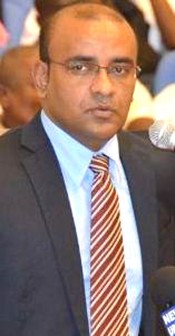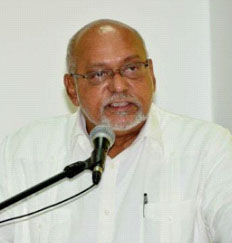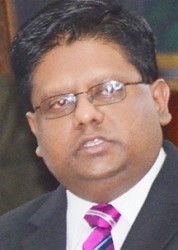While the PPP’s delay in naming its MPs for the 11th Parliament gels with its continuing claims that the May 11th elections were rigged it is also giving it breathing room to deal with internal divisions on the way ahead and to determine who will lead it – former Presidents Donald Ramotar and Bharrat Jagdeo or someone entirely new.
Analysts say a range of views have been promulgated – as evidenced by an email from one of its MPs in the last Parliament to colleagues – on how the party should proceed on its loss of power for the first time since 1992.
Having gained no support outside of the party for its claim that the general election was rigged, the 65-year-old PPP is seen as facing a serious internal dilemma even though votes for it in 2015 surged to 202,694 from 166, 340 in 2011. When it unveils its list of MPs, it will be clear who its leader or leading lights will be and the pressure is on the party to respond to public perceptions that the last 15 years of its tenure in office was riddled with corruption and cronyism.

The 38,000 increase in votes was largely seen to be linked to the negative and scare-mongering campaign helmed by former President Jagdeo. It has been described as the most divisive and provocative campaign ploy in recent times. His first race-based salvo at Port Mourant at a memorial for PPP founder, the late President Cheddi Jagan triggered wide condemnation.
Seen as the invisible hand behind the 2011-2015 Ramotar presidency, the PPP’s major challenge is thrashing out what role Jagdeo will play at all if any. Many in the party blame his tenure in office, his close ties to controversial businesspersons, the breakdown in law and order and his perceived opulent lifestyle for the loss of the party’s parliamentary majority in 2011 and the outright defeat this year.
While he may have attracted many more votes to the party this year, analysts say he also galvanized support for the opposition in equal measure. He has also over the years been saddled with the accusation that he has moved the party far away from the principles of the Jagans and into the arms of those that have been given privileges by him and to business cronies. His attempt earlier this year to compare his lifestyle to the Jagans also evoked the wrath of the PPP faithful.
Thought to have harboured third-term ambitions for a number of years, observers say what will play out in the executive and central committees of the party in the coming weeks largely depends on whether Jagdeo will be able to continue exerting influence over the party executives now that the PPP is out of office.
In her email to party members on June 7th setting out where she stood on entering the 11th Parliament and the future leadership of the party, former MP Vindhya Vasini Persaud made no mention of Jagdeo at all. That would likely be interpreted as a vote of no-confidence in him. Instead, Persaud suggested that former Finance Minister Dr Ashni Singh be made the Leader of the Opposition and presumably given the top position in the party.

Noting that the party had engaged in protest activity over the last few weeks and had gained minimal support from the public and its support base throughout the country, Persaud suggested that this was due to the party’s failure to present to the public concrete evidence or convincing information in support of its claim of significant rigging of the May 11 elections.
“I think the points of recount and lack of transparency have all been made by now. The protest actions have not yielded the desired results. In addition, positive responses from the international community and rights groups have not at all been forthcoming. To continue in this vein, emphasizes the fact that we have no influence in these quarters. Instead, we are perceived as disgruntled. This is demoralizing to our 200,000 + support base! I feel that the proposed exercise will harm us in more ways than it could possibly help”, she stated.
She urged that the party go to parliament.
“I strongly urge, as I did previously at our meeting, that we go to Parliament and represent our support base as a formidable opposition. We need to demonstrate a positive and united approach as a party and represent Guyanese at the highest level holding the de facto Government accountable for their actions. Their many actions taken since their ascendancy require our scrutiny, objection and rejection. In the height of rigged elections, Dr. Jagan went to Parliament as Opposition- he understood that the party’s voice needed to be heard and recorded at that level”, Persaud asserted.
Brilliance
As to who should lead the opposition, Persaud said that this person must showcase everything the “de facto” government didn’t: youth, brilliance, articulate expression and a sound grasp of the country’s financial status.

“I would like to propose Dr. Ashni Singh as representing these. Our opposition needs to be a blend of experience tempered with competent and politically astute youth.
The experience of Gail Teixeira, Carolyn Rodrigues-Birkett, Indra (Chandarpal), Elisabeth Harper and Robeson Benn should not be squandered”, she said.
She added that for the PPP to be appealing as a party in the current climate, its members must be “clean” , competent and credible.
She pointed out that the party was still reeling from the elections and pre-elections debacles such the tape recording released last year of former AG Anil Nandlall in a damning conversation with a reporter, the issue involving former Health Minister Dr Bheri Ramsaran and his verbal abuse of rights activist, Sherlina Nageer and what she described as corruption at various levels.
She said that recent instances of corruption, mismanagement and poor judgement from candidates and party members have further eroded support for the PPP.
“The issues of the campaign billboards being charged to GWI/Ministry of Housing and using Ministry of Tourism monies for flights to NY for campaign purposes – clear misuse and abuse of taxpayers monies. These validate the allegations of corruption that have dogged us”, she contended.
Move on
Candidate on the PPP/C list for the May 11 elections, Clinton Urling had also upped the ante against Jagdeo’s continuing domination of the PPP when he said in a letter to Stabroek News that the party had to move on without the former President.
Speaking about the period following the elections, Urling said: “…many party members, junior or senior, reflected on why the party lost, ready to put the blame squarely on Jagdeo’s shoulders. There was no place where I turned that I did not hear party members and supporters whisper and angrily criticize Jagdeo’s divisive campaign rhetoric. The general belief was that under his presidency the party lost its way from being a “wholesome” political organisation which attracted many friends and allies to becoming one where perceptions of impropriety and corruption had created ominous clouds over the party’s image.
“For many within the party, while the loss was disappointing it also presented an opportunity for rebirth, redemption and change in the way in which the party operates. It justifiably should have been the start of a complete break from the politics of Jagdeo and his loyal circle within the PPP”.
He said that it would be a difficult task for the party if it continues on the current path with Jagdeo as de facto leader.
“Plainly stated, the party has to move on without Jagdeo if it is to ever recapture its former political prestige”, he had stated.
Former PPP stalwart Ralph Ramkarran writing in his May 31st Sunday Stabroek column headlined `Can the PPP be saved?’ had also pointed to the danger posed to the party by Jagdeo’s continued influence.
He said: “Jagdeo is not one to sit on the sidelines. If he returns to Parliament, even if he does not become Opposition Leader, it would be a signal that his political ascendancy in the PPP is assured. Thereafter it would only be a matter of time before he eases out Ramotar and (Clement) Rohee, who are both in their mid 60s, ‘old’ in Jagdeo’s eyes, while he is in his early 50s. Even if he is not in Parliament, his toxicity notwithstanding, his tenure will continue, being seen now as the main Indian ethnic leader of a party that has lost its political and moral compass”.
While Jagdeo poses one dilemma, analysts say Ramotar, 64, poses a completely different one. He presided over the 2011 election where the party lost its majority for the first since 1964 giving the country its first hung parliament. During his term, December 2011 to May 2015, critics have said that Ramotar delivered no major programmes or policies and many key initiatives stalled under him because of the opposition’s control of Parliament. Despite the stalemate in Parliament, critics say that Ramotar made no bold political moves to overcome the government’s minority status by trying to strike an agreement with either A Partnership for National Unity (APNU) or the Alliance For Change (AFC). Instead, what ensued was an ever-increasing divide between the government and APNU and the AFC on a raft of issues including the Amaila hydropower project, the anti-money laundering bill and crucially, the budget.
It was the absence of a modus vivendi on the budget which caused APNU and the AFC to rise against the government over $4.5b in expenditure by Finance Minister Singh, triggering a motion of no-confidence against the government which was to be moved on November 10 last year in Parliament. Ramotar’s response was to immediately prorogue the 10th Parliament evoking widespread condemnation here and abroad and from western diplomats here. Having failed to find a solution to the political divide, analysts say that Ramotar and his political mandarins failed to anticipate the prospect of a pre-election alliance between APNU and the AFC. When this swiftly materialized on February 14 this year, analysts said it left the PPP and the government flat-footed, Ramotar having failed to prevent an alliance which he would have known would shake the foundations of PPP governance.
Under these circumstances and considering his uninspired leadership, Jagdeo’s apparent influence over him and the need for the party to change direction, another period of Ramotar leadership would be seen as a retrograde step for the party.
If the party goes for new blood as the conventional wisdom signals, that would also mean no major role for current General Secretary Clement Rohee and one-time contender for the party’s presidential candidate.
Following the distance between one-time rising star and former Minister of Natural Resources Robert Persaud and the party, younger successors would be seen to be coming from the ranks of Ashni Singh, former Culture Minister Frank Anthony and former Education Minister Priya Manickchand. Former Attorney General Anil Nandlall is believed to have been severely tarnished by last year’s phone recording scandal.
On the question of new blood, Ramkarran in his column had said:
“There is talk of bringing in young faces. But what of those introduced in 2006 – Robert Persaud, Frank Anthony, Priya Manickchand, Ashni Singh, Irfaan Ali and Anil Nandlall? Of more recent vintage are Colin Croal, Nigel Dharamlall, Shyam Nokta. Did they not perform? Or are the new young people going to replace the ‘old’ people, a category of citizen that Jagdeo continually reviles? If so, shouldn’t Ramotar, Rohee, (Gail) Teixeira and (Roger) Luncheon, even Jagdeo, be among those to be replaced? Resignation, regardless of age, is what happens when you lose elections. Ed Miliband, the Labour leader, who just lost the UK elections, is 46 and he has resigned.”




